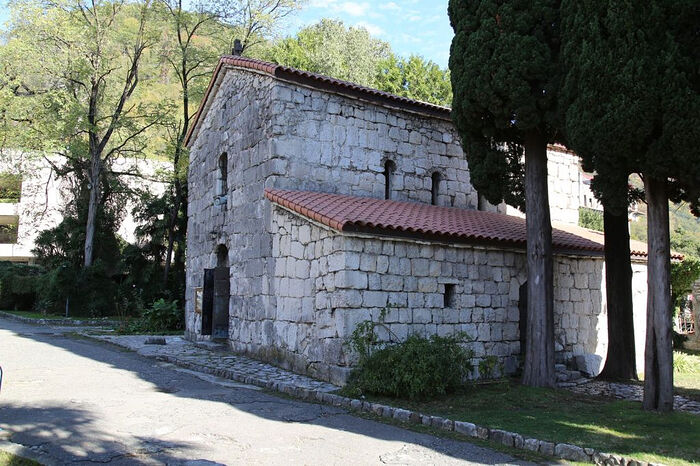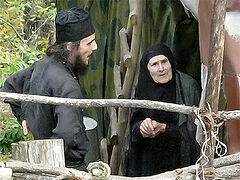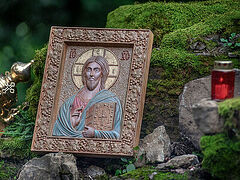At the entrance to the town of Gagra all those visiting warm and hospitable Abkhazia are greeted by the sixth-century Church of Hieromartyr Hypatius of Gangra. Approximately fifteen centuries ago, Christians built the Church of the Protection of the Mother of God within the Abaata Fortress, the oldest defensive structure of the area. Later it was dedicated to St. Hypatius of Gangra, bishop of the city of Gangra in Paphlagonia, a region in Asia Minor. Alas, the church did not escape ravages and desolation, but, having been restored in 1902 at the expense of Princess Eugenia Maximilianovna of Oldenburg (1845–1925), Emperor Nicholas I’s granddaughter, it brought together hundreds of believers for prayer. In 1917, the church was closed again, now by the Bolsheviks, only to be opened as a museum in the late 1950s.
Despite the fact that the Abaata Fortress has not survived in its original form, the church—the oldest example of a three-nave basilica—remains intact.
In 2009, the self-styled Abkhazian Orthodox Church was established.1 Many Orthodox churches and monastic complexes on the territory of the republic were transferred to it. In 2012, with the blessing of Patriarch Kirill of Moscow and All Russia the church was re-consecrated, and services began to be regularly celebrated in it.
If we turn to historical sources, we can see that there are different versions regarding the church’s patron-saint: either Hieromartyr Hypatius of Gangra (feasts: March 31 and November 16)—a bishop who took part in the First Ecumenical Council at which Arianism was condemned, or Hypatius (Ipaty) of Gagra, who lived as a hermit in a cave near Mamzyshkha Mountain in the eighteenth century.
 “We have an icon of Hypatius of Gagra, a monk and ascetic who lived here,” Igumen Athanasy (Kovalchuk), the rector of the church, explains. “We venerate both saints, but the church was originally consecrated in honor of Hieromartyr Hypatius of Gangra. About ten years ago, Abkhazians began to receive Baptism en masse. I have served here for about twenty years now and I remember once baptizing 100 adults in the river at the same time. For almost four hours I was knee-deep in water and did not get sick by the grace of God. Another priest was baptizing 100 children in the church that day. Many converted to Christ here after the Georgia-Abkhazia War of 1992–93. Now fewer people wish to get baptized, because many have already embraced the faith, and more than half of the Abkhazians are Christians. There are also Muslims and pagans in the republic. But here people try to get along and live in peace. In Chechnya and Dagestan the situation is more explosive, while it is relatively quiet in Abkhazia.”
“We have an icon of Hypatius of Gagra, a monk and ascetic who lived here,” Igumen Athanasy (Kovalchuk), the rector of the church, explains. “We venerate both saints, but the church was originally consecrated in honor of Hieromartyr Hypatius of Gangra. About ten years ago, Abkhazians began to receive Baptism en masse. I have served here for about twenty years now and I remember once baptizing 100 adults in the river at the same time. For almost four hours I was knee-deep in water and did not get sick by the grace of God. Another priest was baptizing 100 children in the church that day. Many converted to Christ here after the Georgia-Abkhazia War of 1992–93. Now fewer people wish to get baptized, because many have already embraced the faith, and more than half of the Abkhazians are Christians. There are also Muslims and pagans in the republic. But here people try to get along and live in peace. In Chechnya and Dagestan the situation is more explosive, while it is relatively quiet in Abkhazia.”
The rector’s faithful assistant, Nun Evfrosinia (Gordiyuk), echoes his words:
“I believe that we, Russians and Ukrainians (and I am from Ukraine) should learn faith from them. If an Abkhazian embraces Orthodoxy, he is afraid to offend God even in trifles. Of course, there are also many pagans and atheists here, but I am glad that on Sundays about thirty people take Communion—and this is at the height of the summer season when most locals are busy receiving tourists, working in their gardens, and foreign vacationers are relaxing by the sea.”
Mother Evfrosinia is an indispensable person in the church. She is a reader, a singer, and choir director, and manages to work in the church shop. She is also Igumen Athanasy’s personal driver. He is often called to perform services of need, and travelling by public transport is hot and takes a lot of time, so Nun Evfrosinia comes to his assistance. Now prosphora are delivered here from the Sukhumi Cathedral, but earlier, after all other obediences, she used to bake prosphora at home at night. And this work is very physically hard. She lives in another region of Abkhazia, so sometimes she has to spend the night in a small cell attached to the church.
“A monastic doesn’t care where he serves so long as he has the opportunity to serve God and people. And since God brought me here, I’m needed here. But I think that it would be easier at a convent than here, because a monastic has certain obediences and performs them (baking prosphora or taking care of the livestock). But here I have all obediences at once; but I don’t complain, because the Lord gives me strength, even if there is not much of it left (I’m already sixty-three...)”
Matushka is a wonderful person. She dreamed of becoming a nun in her youth, but she received the tonsure at the Pochaev Lavra after the death of her mother, who had spent twenty years in labor camps without betraying the faith and truth.
“The seed sown by my mother took root in me,” Nun Evfrosinia relates. “It was she who first told me about the Lord and the Mother of God. I had wanted to become a nun for a long time, but then my spiritual father did not bless me, and I adopted a four-month-old girl named Nadya [a diminutive form of the name Nadezhda.—Trans.]… This has been such a spiritual ‘school’! Now I realize what genetic inheritance means... My foster-daughter is already eighteen and she helps me in the church.”
At the words “Pochaev” and “Ukraine”, mother Evfronsinia’s eyes instantly became red and wet with tears. She asked to wait for a minute before she could continue her story:
“I can’t talk about it calmly... The Lord took me away from there even before the ‘Maidan’ revolution of 2014, but I kept wondering why, because everything seemed to be fine there. Now I understand that it was God’s Providence. The Pochaev Lavra is a special place for me, and I always pray to the Lord that bloodshed would stop.”
For over thirty years Fr. Athanasy struggled in the Holy Dormition Pochaev Lavra, then in the Holy Spirit Monastery of Vilnius and in the Moscow St. Daniel’s Monastery. Next he proceeded to serve in several more monasteries and parishes, and for over twenty years now batiushka has lived in Abkhazia. When the Abkhazian monastery of Akhali Atoni (“New Athos”) went into schism, Igumen Athanasy immediately left it. Now he is the rector of the ancient church in Gagra.
“The Abkhazian language is very difficult: I don’t speak it, but locals come here to pray, which means that we must serve in their native language. We read the Hours in Abkhazian and the Creed and ‘Our Father’, along with some troparia and kontakia for the feasts, are always sung in two languages. Our choir director is an Abkhazian and knows the language, so there are no problems with this.”
The church in Gagra is quite small and can hardly accommodate even fifty people. It does not stand out for any special artistic treasures, but a church that has heard so many prayers, so many words of repentance, and has seen so much love and so many miraculous healings, will not let you leave. On crossing the threshold of this church, you find yourself in another world. Outside, there is a noisy summer, music, the sounds of cars passing by, and the sea, but here there is silence, peace and a leisurely conversation with God.
“A real miracle occurred here a couple of years ago on Pascha,” Nun Evfrosinia recounts. “While everyone was waiting for the descent of the Holy Fire in the Church of the Holy Sepulcher in Jerusalem on Holy Saturday, we saw a flash of light—something like the phenomenon observed annually at the Edicule in the Lord’s Sepulcher. And on a photo taken by one of our parishioners after the Trinity Sunday an angel spreading its wings can be seen.
“People visiting our church often say how good they feel here. Of course, this is the House of God. And everything depends on people: we receive all visitors here with love, and everyone is welcome. After the Liturgy we always invite everyone for lunch, no matter whether they drive expensive cars or can only afford to make a donation for the smallest candle.
“The President of Abkhazia Aslan Bzhania has already visited our church twice. He is a very religious and caring person—he has promised to help in solving some of our problems.”
Unfortunately, the church has a lot of problems, and first of all the lack of a building for its Sunday school. A few years ago, children here were taught the Law of God, there were drama events on spiritual themes, and sculpture lessons. Now, alas, this is impossible.
Another problem is funding. The parish lives on donations, and it has no patrons or benefactors. They have to earn money themselves for the church maintenance, decoration, and the purchase of church vessels. But the parish tries to help everyone who asks for help with food, clothes, money, etc. Pensions in Abkhazia are very small, and it is unclear how people manage to survive.
“We don’t complain, God forbid!” Nun Evfrosinia continues. “The Lord and the Mother of God do not abandon us, and, of course, our patron-saint Hieromartyr Hypatius helps us. Over the course of two years we have managed to save up for bells, which now stand in front of the church. I myself learned how to ring them—oh, if only there were someone to help me with this. I have a musical education, I used to sing in the choir, but bell ringing is really an art.”
According to the ancient monastic custom, one of the monks should read the Lives of the saints at every meal. And here, in the parish church, with the blessing of the rector there are no idle conversations during dinner—everyone listens to edifying reading. Having finished his frugal meal earlier than the others, the deacon, who usually starts reading, is followed by Fr. Athanasy himself.
His heart bleeds for the younger generation, for whom the internet and TV have replaced God.
“Sometimes very strange people come,” the rector laments. “Once I asked a group of women to put headscarves on. And they said in response: ‘We have come to repent, and you are showing us the door!’… I didn’t scold them and kept a friendly tone of voice, but they were indignant. Many come and tell us not to teach or reproach them. That’s what people have come to! There used to be a high level of culture, and even an atheist would not have allowed himself such things. I remember how even under Brezhnev guests were not allowed into restaurants without a jacket and a tie on. But now such people have the cheek to enter church half-naked and don’t even feel shame! Honor and conscience have been lost—everything has been lost. They go to church as if it were a museum or a shop. Before, even atheists had fear and reverence for the Church.
“We must speak about peace. Now there is no peace among Christians, and families fall apart. The TV and the internet work everywhere and are very destructive. Archimandrite Raphael (Karelin) speaks of these things as of destructive forces that turn everything into a lifeless desert. God showed Elder Cosmas of Aetolia that in every house there would be a devil in the holy corner, and his horns would be on the roof of the house. The Holy Fathers say that formerly the devil used to tempt people at a distance, and now he takes a soul and plays with it as with a doll. And this happens at any age: from infancy to old age. Through the internet, through games the enemy has taken the minds and hearts of many people and captivated them. And many now become possessed and turn into zombies. Once I saw two boys who came to spend their vacation here but did not even go to the sea! They spent all their time on their gadgets and were not interested in anything around them.
St. Ignatius (Brianchaninov) wrote that in the end times all the temptations of the world (which had never been before and would never be again) would come, and it would be almost impossible for anyone to attain salvation. But the Lord would save monks and people in the world through sorrows, suffering and illnesses. There will be no other way. The Lord will send sorrow and sickness to everyone, because this would be the only way to attain salvation. The first Christians performed great spiritual labors of fasting and prayer. Now this is no longer the case, and people are getting ever weaker. But to people who want to be saved the Lord sends suffering, sorrows, illnesses and failures. We must endure everything and accept it with gratitude to God. May the Lord help us all!









